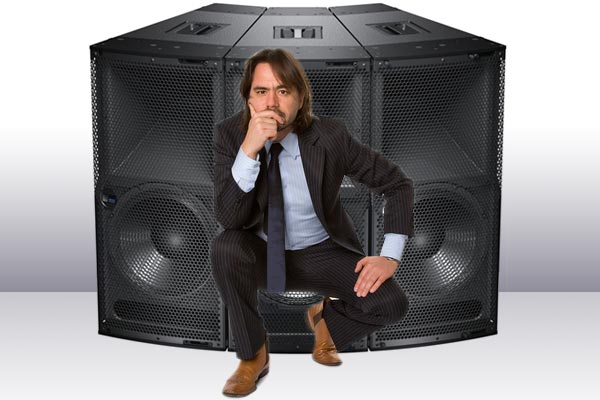During my freelance years in pro audio, I was driven with ambition. It wasn’t enough to mix with other people’s gear, I had to have my own.
In my mind, the safe zone appeared in the form of building up my own company and being a boss that couldn’t be fired. Been through that before. Didn’t like it.
From mixing on systems for churches and outreach ministries, it evolved into helping with projects outside those groups and eventually the corporate and concert worlds. As I learned the skills and developed contacts, more and more work began coming in.
Since I’m not generally known for my ability to find a groove and stay with it, I felt like the natural progression meant owning my own systems and studio. Freelancing tends to be inconsistent income, based on the seasons. I wanted stability and consistency.
Yeah, I know. Ha.
Honestly, looking back years later, it might have been a better call to have maintained freelance status and learned some contentment.
As a freelancer, I had virtually unlimited flexibility. If I didn’t want a particular gig, I didn’t have to take it. It also allowed me to pack the necessary tools of the trade into a backpack and be done with it. For most shows, I usually arrived with a basic tool kit, headphones and a laptop. Not trucks full of gear, just a few pounds of critical toys.
I had no overhead. When something failed, loudspeakers died, cabling was damaged, or even those “amusing” situations where gear was stolen, it wasn’t my responsibility to pay for any of that. I was even paid to make needed repairs and/or help track down what was missing or damaged.
If there was a show-stopping, contract-defying, pull-your-hair-out-because-nothing-was-coming-together moment, I was still on the clock. It simply wasn’t my responsibility to manage those situations.
But things changed rather dramatically once I began stockpiling gear to pursue my own shows and recording projects.
If I underbid a gig and something stupid happened, it was all on me. Hauling thousands of dollars’ worth of gear around adds up quick. Flat tires, gas prices, blown drivers, stolen cables, clients who pull stunts with the money… All of it became my problem.
Blowing a $200 subwoofer on a gig with a $200 pad wipes out any profit while also leaving you to pay for the gas, waste your time, assume any other costs—in other words, going home in the hole. It happened several times. The last one finally put me out of the sound reinforcement provider game.
We just couldn’t recover from one severely miscalculated bid for a run of shows, after a transmission went out and gas prices spiked up to over four bucks a gallon. Ten days of shows, about 700 miles from home, and limping back to figure out how to cover those losses.
Even when I was doing studio work, there were plenty of opportunities to continue freelancing, but I wanted my own place.
The last two endeavors were failures in such awesome ways.
First, I partnered with a friend to take over 2,500 square feet of unused space from another friend who ran his business there. It was a sweet deal. The studio build took nine months of my life and wore me out. We started pulling in a few projects and things were looking promising.
But three months after opening, the third guy in the deal was offered a job that paid way more than his business made for him. We had the option to take over a $4,000 monthly rent agreement or pack it back up. So to wrap up a full year of work with absolutely nothing to show for it, I tore it all back out.
Next, just for good measure, I did almost the exact same thing again. Never made enough to cover the expenses of either studio.
The ironic part of it all was how I paid the bills during all those fiascoes: Freelancing kept the money coming in. That work didn’t run out. The studio builds and the failed production company were financed by my freelance work.
How did I not see that at the time? Why didn’t I just keep going and enjoy the ride without adding all that extra stress and frustration?
I’m not saying that everyone needs to choose one route over the other, just that before making these types of decisions, it’s very prudent consider our personality type and evaluate those long-term plans with some degree of reality connected to them.
If you absolutely love to mix but hate managing the details and money, see that for what it is. If you enjoy bookkeeping, scheduling and contract negotiation, maybe you’re more geared towards the business side. Just make an honest assessment of your skills and passions before allowing some internal drive to push you out of your area of expertise.
The fact is this: Most successful business owners started out doing the work themselves. They eventually had to take their hands off whatever originally triggered their passion and focus on the business side. That means that to be successful and make the big bucks, they probably stopped mixing.
It’s vital to keep that in mind.
There’s nothing wrong with freelancing. There are no great accolades for crossing the line to business owner. One is not necessarily better than the other. It’s not always about the money, and pushing some delusional goals might just break you.
Sometimes it’s about nothing more than finding a gig you love and making it work.





